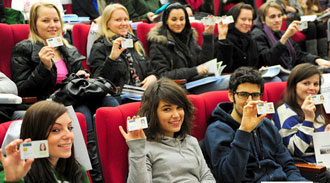There are now nearly as many foreign students studying in Korean universities as Koreans studying in the U.S. But many foreigners are complaining about various shortcomings in their Korean educational experience.
The speed of S. Korea’s rise into the ranks of the world’s top 10 industrialized nations has caused many foreigners to see it as having one of the brightest prospects for providing fast-track career opportunities. During the past five years the enrollment of foreign students in S. Korean universities has surged 35% to over 100,000 now, about the same as the number of Korean students enrolled in US universities.
But these students are finding that S. Korean universities aren’t as capable at providing quality educational experiences as they were led to believe from the glowing sales pitches they offer on overseas recruiting missions. At a recent forum for international students, complaints arose about the high cost of living, the lack of quality courses taught in English, expensive health care and the difficulty of registering a cell phone.
The high cost of living was the biggest complaint. The shortage of adequate dormitory facilities force many students to rent apartments. Cities like Seoul, Busan and Daegu are expensive even for Korean natives, but the costs are even higher for foreigners who are unable to rent apartments using the key-money system locals use and must pay for limited number of exorbitant short-term apartment rentals geared for foreigners. The same goes for the cost of buying food. Imported foods suitable for some foreign tastes typically cost twice what it would cost back home.
The second most common complaint is the lack of information in English. Even in university courses and in courses that are supposed to be taught in English, students are finding that professors lacking in English proficiency switch to Korean for long segments of each lecture, leaving foreign students to grope at comprehension.
“There are not that many English lectures and even in English lectures the professor would really prefer to speak Korean and they speak Korean a lot,” grumbled one French student at Seoul National University.
“He will sometimes speak Korean for five or 10 minutes with the [Korean-speaking] students then he will give only a one-minute translation,” said another student who requested anonymity.
“We have a lot of problems buying food; there are not a lot of translations even on campus, said a business student. “Even the buses are only in Korean.”
The lack of accommodations for foreign students with special dietary needs of foreign students is another major gripe.
“(With) eating I have a problem,” said Shukria, a Muslim student at Seoul National University. She finds it difficult to find the Halal meets required by the strict dietary rules of Islam.
“I can make something at home but then I cannot share a lot of things with my (Korean) friends,” she said.
A Hindu graduate student from India complained about the scarcity of restaurants serving vegetarian fare.
They note that Korean prisons for foreigners are able to serve Islamic and other dishes for inmates and are baffled that a world-class university is unable to do the same.
Some students from Asian nations feel that Korean students treat them less well than they treat students from western nations.
“If I do a (group) project with them (Korean students) they had a problem when I did the power point presentation,” said Feruza Buranova, a Yonsei University sophomore from the former Soviet republic of Uzbekistan.
She complained that her Korean teammates kept asking her to redo her presentation without offering to help.
“They don’t want to understand me,”she said. “They just want to do it (group projects) with Koreans and not foreigners.”
“[My Korean class partners] were not mad but they weren’t happy at all that they couldn’t speak English although it was a more of a ‘meet Korean people and practice Korean’ thing,” said a student from China named Laura.
“To be honest, I feel that most Koreans prefer whites,” said Miguel, an SNU Filipino-American exchange student.
Even western students complain about the peculiar Korean prejudices in favor of English-speaking foreigners.
“Even when you speak to them in Korean they would continue to speak to you in English,” said a Yonsei University Swedish exchange student about the buddy system that pairs foreign students with Korean students. “Even when I speak to them in Korean, they keep speaking to me in English.“
“I sometimes get the feeling that maybe people just want to talk to me to practice their English,” said 21-year-old Seoul University European exchange student.
Sometimes the discrimination can take even more overt and offensive forms.
“When I’m eating a meal or talking to my friends, I have heard on numerous occasions someone cursing at me in the background,” said a Yonsei University Korean-Japanese student. “They don’t say it (profanity) to me directly but they say it within my earshot,” he said. He found the experience hurtful.
But most acknowledge that the universities make every effort to address their complaints when they are brought to official attention.
“People in Korea are very nice,” said Ashwini Ann Bavidson, a Malaysian exchange student at Yonsei University.
She said she was happy with her Korean experience, echoing the sentiments of a majority of foreign students.


